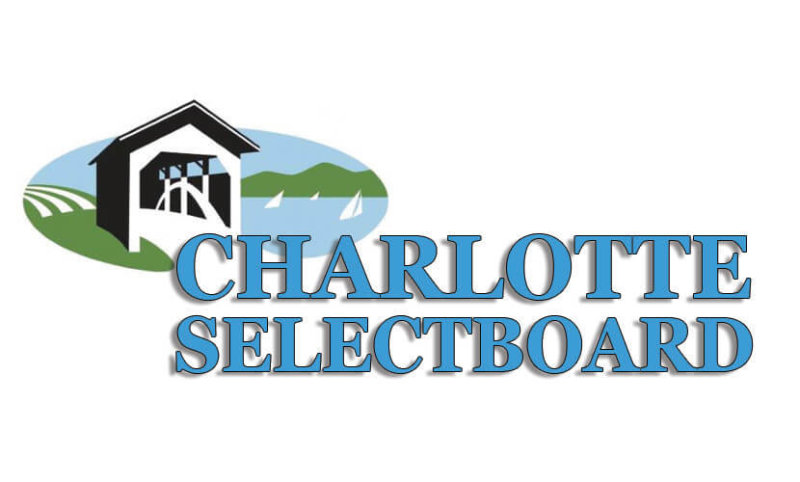Selectboard to decide on Development Review Board at Oct. 25 meeting
Unwarned motion to adopt a DRB catches board members off guard
After almost seven months of debate and discussion between town committees and boards, the Selectboard is scheduled at its Oct. 25 regular meeting to decide if the town will have a Development Review Board (DRB).
A large majority of the towns in the state now have a DRB for planning and decision-making when it comes to potential developments in town. But in recent months, the idea of a DRB in Charlotte has been strongly debated, with various members of the municipal government coming out both for and against the establishment of the board.
 At the regular meeting on Oct. 18, after two hours of hearing from residents and town officials on both sides of the fence, board member Matt Krasnow made a motion to establish a DRB for the town.
At the regular meeting on Oct. 18, after two hours of hearing from residents and town officials on both sides of the fence, board member Matt Krasnow made a motion to establish a DRB for the town.
Krasnow’s motion, which he said was from the Vermont League of Cities and Towns, stated that “[I]t is hereby resolved by this board that it shall establish for the Town of Charlotte, effective October 18, 2021, the Development Review Board, which shall consist of five members and shall have the authority to exercise all of the functions of the Zoning Board of Adjustment as set forth in 24 V.S.A. Chapter 117, and shall further exercise all development review functions performed by the Planning Commission pursuant to 24 V.S.A. Chapter 117.”
Krasnow’s motion went on to state that the five members of the Development Review Board “shall serve for terms for three years with individual appointments to the DRB to occur on October 25.”
The motion provided that “all matters presently pending before the Zoning Board of Adjustment shall be completed [by the board], and upon completion of all pending matters, [the board] shall cease to exist. All land use matters presently pending before the Planning Commission shall be completed by the commission.”
The motion was seconded by Chairman James Faulkner.
The agenda for the Oct. 18 agenda did not warn that the board would decide on a DRB; it listed only a third public discussion of the possibility of establishing the board.
Krasnow’s motion was questioned by Selectboard Member Lewis Mudge, who asked if the board could legally vote on a motion that was not publicly warned.
Chairman Faulkner assured Mudge that the motion was legal.
Vice-chair Frank Tenney was not persuaded. “First of all, I haven’t seen this document before,” Tenney said of the motion Krasnow read from Vermont League of Cities and Towns. “I can’t vote on that until I read it myself. This is a total surprise to me.”
“I would appreciate processing some of the stuff that I’ve heard,” Mudge continued. “I’ve never been one way or another on this issue because I don’t know much about zoning. I would like to take another week [to decide].”
The motion was tabled to the Oct. 25 meeting.
During the meeting, and before Krasnow’s motion, members of the town’s Planning Commission and Zoning Board of Adjustment spoke about the proposed DRB.
Planning Commission Member Bill Stuono told the board that he opposes a DRB. “There have been two misconceptions that have been bandied about; one of them is that the Planning Commission has no time to do plans,” Stuono said. “We definitely have the time. We always talk about zoning changes, and we went two months without any applications. If you want us to do more, or quicker, we can do that. The other thing is that it keeps getting mentioned that we need to separate the legislation from the judicial. There’s nothing in the statute that says we need to do that. This is land use; this is not legislation.”
However, Zoning Board of Adjustment Chairman Lane Morrison sent a letter on behalf of the zoning board in support of the proposed DRB.
Morrison wrote that the board believes that a DRB would be a “more effective model” than the current Zoning Board of Adjustment and Planning Commission system.
In his letter, Morrison wrote that a DRB would “ensure the highest quality development review for applicants, the town, and interested parties in terms of consistency, fairness, and professionalism.”
He also wrote that a DRB would “support and improve the development review process with ongoing training for staff and volunteers” and would “reduce staff and volunteer turnover by having the development review process be a positive experience.”
More letters from residents and town officials concerning the proposed DRB can be found at this link.
If you enjoy The Charlotte News, please consider making a donation. Your gift will help us produce more stories like this. The majority of our budget comes from charitable contributions. Your gift helps sustain The Charlotte News, keeping it a free service for everyone in town. Thank you.
Bill Regan, Chair, Board of Directors



